Review of Entrepreneurship and Small Business Research
VerifiedAdded on 2020/10/05
|14
|4765
|392
AI Summary
The provided document is a compilation of research papers and articles related to entrepreneurship and small business. It covers topics such as the role of SMEs in the UK economy, ethnic entrepreneurship in Macedonia, education and training in entrepreneurship, electronic commerce adoption, and qualitative research methods. The papers are sourced from various journals and publications, including the International Small Business Journal, Small Business Economics, and Mediterranean Journal of Social Sciences.
Contribute Materials
Your contribution can guide someone’s learning journey. Share your
documents today.

Entrepreneurship
and Small Business
Management
and Small Business
Management
Secure Best Marks with AI Grader
Need help grading? Try our AI Grader for instant feedback on your assignments.
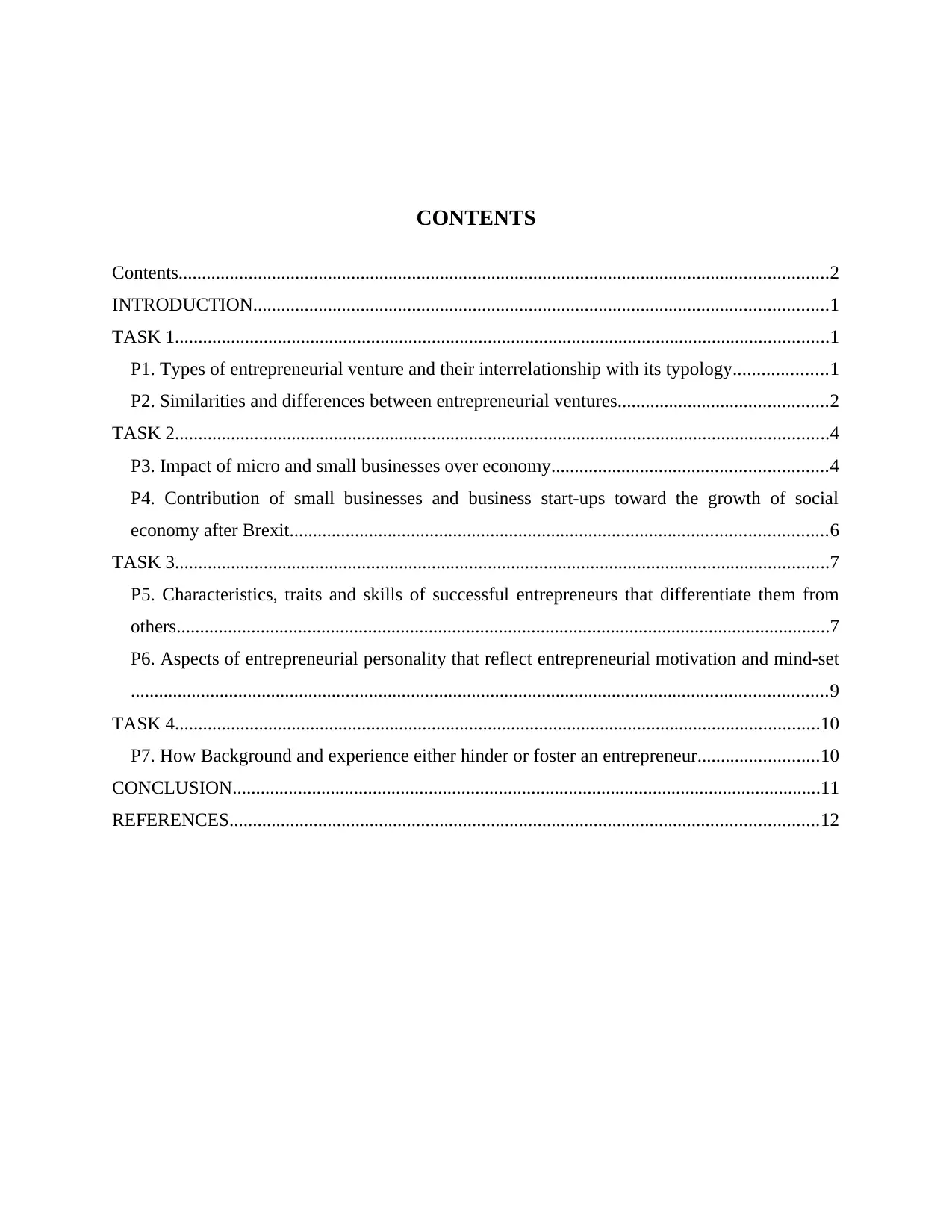
CONTENTS
Contents...........................................................................................................................................2
INTRODUCTION...........................................................................................................................1
TASK 1............................................................................................................................................1
P1. Types of entrepreneurial venture and their interrelationship with its typology....................1
P2. Similarities and differences between entrepreneurial ventures.............................................2
TASK 2............................................................................................................................................4
P3. Impact of micro and small businesses over economy...........................................................4
P4. Contribution of small businesses and business start-ups toward the growth of social
economy after Brexit...................................................................................................................6
TASK 3............................................................................................................................................7
P5. Characteristics, traits and skills of successful entrepreneurs that differentiate them from
others............................................................................................................................................7
P6. Aspects of entrepreneurial personality that reflect entrepreneurial motivation and mind-set
.....................................................................................................................................................9
TASK 4..........................................................................................................................................10
P7. How Background and experience either hinder or foster an entrepreneur..........................10
CONCLUSION..............................................................................................................................11
REFERENCES..............................................................................................................................12
Contents...........................................................................................................................................2
INTRODUCTION...........................................................................................................................1
TASK 1............................................................................................................................................1
P1. Types of entrepreneurial venture and their interrelationship with its typology....................1
P2. Similarities and differences between entrepreneurial ventures.............................................2
TASK 2............................................................................................................................................4
P3. Impact of micro and small businesses over economy...........................................................4
P4. Contribution of small businesses and business start-ups toward the growth of social
economy after Brexit...................................................................................................................6
TASK 3............................................................................................................................................7
P5. Characteristics, traits and skills of successful entrepreneurs that differentiate them from
others............................................................................................................................................7
P6. Aspects of entrepreneurial personality that reflect entrepreneurial motivation and mind-set
.....................................................................................................................................................9
TASK 4..........................................................................................................................................10
P7. How Background and experience either hinder or foster an entrepreneur..........................10
CONCLUSION..............................................................................................................................11
REFERENCES..............................................................................................................................12
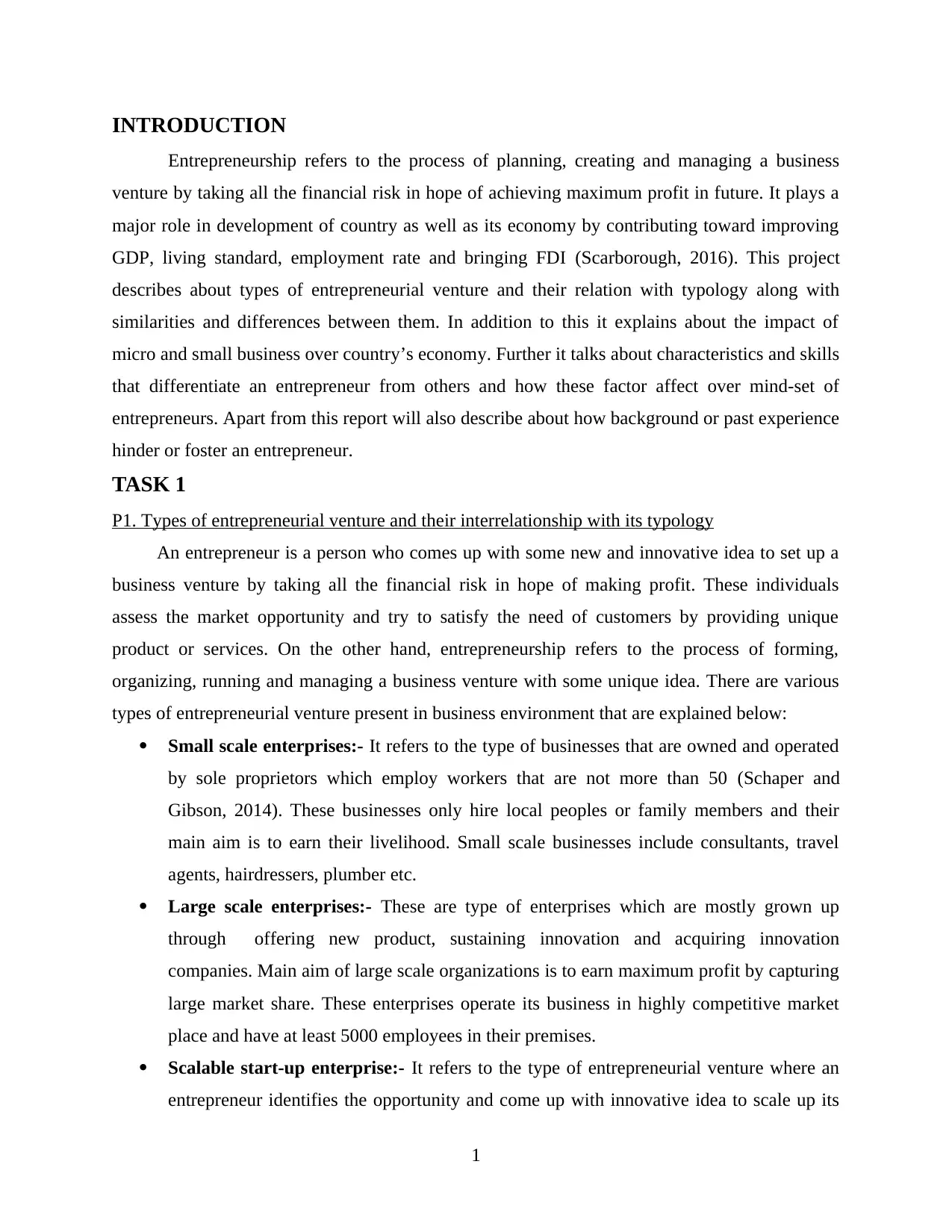
INTRODUCTION
Entrepreneurship refers to the process of planning, creating and managing a business
venture by taking all the financial risk in hope of achieving maximum profit in future. It plays a
major role in development of country as well as its economy by contributing toward improving
GDP, living standard, employment rate and bringing FDI (Scarborough, 2016). This project
describes about types of entrepreneurial venture and their relation with typology along with
similarities and differences between them. In addition to this it explains about the impact of
micro and small business over country’s economy. Further it talks about characteristics and skills
that differentiate an entrepreneur from others and how these factor affect over mind-set of
entrepreneurs. Apart from this report will also describe about how background or past experience
hinder or foster an entrepreneur.
TASK 1
P1. Types of entrepreneurial venture and their interrelationship with its typology
An entrepreneur is a person who comes up with some new and innovative idea to set up a
business venture by taking all the financial risk in hope of making profit. These individuals
assess the market opportunity and try to satisfy the need of customers by providing unique
product or services. On the other hand, entrepreneurship refers to the process of forming,
organizing, running and managing a business venture with some unique idea. There are various
types of entrepreneurial venture present in business environment that are explained below:
Small scale enterprises:- It refers to the type of businesses that are owned and operated
by sole proprietors which employ workers that are not more than 50 (Schaper and
Gibson, 2014). These businesses only hire local peoples or family members and their
main aim is to earn their livelihood. Small scale businesses include consultants, travel
agents, hairdressers, plumber etc.
Large scale enterprises:- These are type of enterprises which are mostly grown up
through offering new product, sustaining innovation and acquiring innovation
companies. Main aim of large scale organizations is to earn maximum profit by capturing
large market share. These enterprises operate its business in highly competitive market
place and have at least 5000 employees in their premises.
Scalable start-up enterprise:- It refers to the type of entrepreneurial venture where an
entrepreneur identifies the opportunity and come up with innovative idea to scale up its
1
Entrepreneurship refers to the process of planning, creating and managing a business
venture by taking all the financial risk in hope of achieving maximum profit in future. It plays a
major role in development of country as well as its economy by contributing toward improving
GDP, living standard, employment rate and bringing FDI (Scarborough, 2016). This project
describes about types of entrepreneurial venture and their relation with typology along with
similarities and differences between them. In addition to this it explains about the impact of
micro and small business over country’s economy. Further it talks about characteristics and skills
that differentiate an entrepreneur from others and how these factor affect over mind-set of
entrepreneurs. Apart from this report will also describe about how background or past experience
hinder or foster an entrepreneur.
TASK 1
P1. Types of entrepreneurial venture and their interrelationship with its typology
An entrepreneur is a person who comes up with some new and innovative idea to set up a
business venture by taking all the financial risk in hope of making profit. These individuals
assess the market opportunity and try to satisfy the need of customers by providing unique
product or services. On the other hand, entrepreneurship refers to the process of forming,
organizing, running and managing a business venture with some unique idea. There are various
types of entrepreneurial venture present in business environment that are explained below:
Small scale enterprises:- It refers to the type of businesses that are owned and operated
by sole proprietors which employ workers that are not more than 50 (Schaper and
Gibson, 2014). These businesses only hire local peoples or family members and their
main aim is to earn their livelihood. Small scale businesses include consultants, travel
agents, hairdressers, plumber etc.
Large scale enterprises:- These are type of enterprises which are mostly grown up
through offering new product, sustaining innovation and acquiring innovation
companies. Main aim of large scale organizations is to earn maximum profit by capturing
large market share. These enterprises operate its business in highly competitive market
place and have at least 5000 employees in their premises.
Scalable start-up enterprise:- It refers to the type of entrepreneurial venture where an
entrepreneur identifies the opportunity and come up with innovative idea to scale up its
1
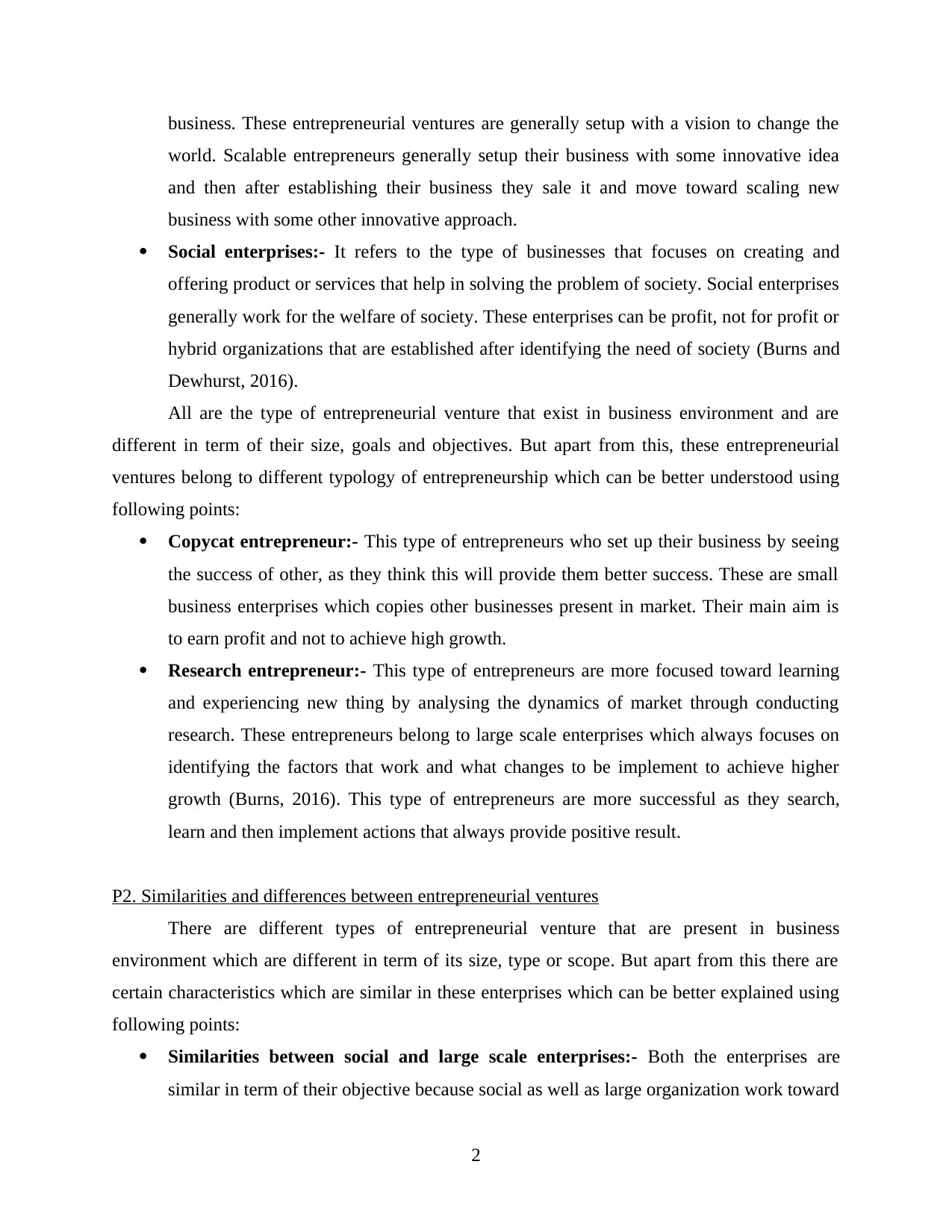
business. These entrepreneurial ventures are generally setup with a vision to change the
world. Scalable entrepreneurs generally setup their business with some innovative idea
and then after establishing their business they sale it and move toward scaling new
business with some other innovative approach.
Social enterprises:- It refers to the type of businesses that focuses on creating and
offering product or services that help in solving the problem of society. Social enterprises
generally work for the welfare of society. These enterprises can be profit, not for profit or
hybrid organizations that are established after identifying the need of society (Burns and
Dewhurst, 2016).
All are the type of entrepreneurial venture that exist in business environment and are
different in term of their size, goals and objectives. But apart from this, these entrepreneurial
ventures belong to different typology of entrepreneurship which can be better understood using
following points:
Copycat entrepreneur:- This type of entrepreneurs who set up their business by seeing
the success of other, as they think this will provide them better success. These are small
business enterprises which copies other businesses present in market. Their main aim is
to earn profit and not to achieve high growth.
Research entrepreneur:- This type of entrepreneurs are more focused toward learning
and experiencing new thing by analysing the dynamics of market through conducting
research. These entrepreneurs belong to large scale enterprises which always focuses on
identifying the factors that work and what changes to be implement to achieve higher
growth (Burns, 2016). This type of entrepreneurs are more successful as they search,
learn and then implement actions that always provide positive result.
P2. Similarities and differences between entrepreneurial ventures
There are different types of entrepreneurial venture that are present in business
environment which are different in term of its size, type or scope. But apart from this there are
certain characteristics which are similar in these enterprises which can be better explained using
following points:
Similarities between social and large scale enterprises:- Both the enterprises are
similar in term of their objective because social as well as large organization work toward
2
world. Scalable entrepreneurs generally setup their business with some innovative idea
and then after establishing their business they sale it and move toward scaling new
business with some other innovative approach.
Social enterprises:- It refers to the type of businesses that focuses on creating and
offering product or services that help in solving the problem of society. Social enterprises
generally work for the welfare of society. These enterprises can be profit, not for profit or
hybrid organizations that are established after identifying the need of society (Burns and
Dewhurst, 2016).
All are the type of entrepreneurial venture that exist in business environment and are
different in term of their size, goals and objectives. But apart from this, these entrepreneurial
ventures belong to different typology of entrepreneurship which can be better understood using
following points:
Copycat entrepreneur:- This type of entrepreneurs who set up their business by seeing
the success of other, as they think this will provide them better success. These are small
business enterprises which copies other businesses present in market. Their main aim is
to earn profit and not to achieve high growth.
Research entrepreneur:- This type of entrepreneurs are more focused toward learning
and experiencing new thing by analysing the dynamics of market through conducting
research. These entrepreneurs belong to large scale enterprises which always focuses on
identifying the factors that work and what changes to be implement to achieve higher
growth (Burns, 2016). This type of entrepreneurs are more successful as they search,
learn and then implement actions that always provide positive result.
P2. Similarities and differences between entrepreneurial ventures
There are different types of entrepreneurial venture that are present in business
environment which are different in term of its size, type or scope. But apart from this there are
certain characteristics which are similar in these enterprises which can be better explained using
following points:
Similarities between social and large scale enterprises:- Both the enterprises are
similar in term of their objective because social as well as large organization work toward
2
Secure Best Marks with AI Grader
Need help grading? Try our AI Grader for instant feedback on your assignments.
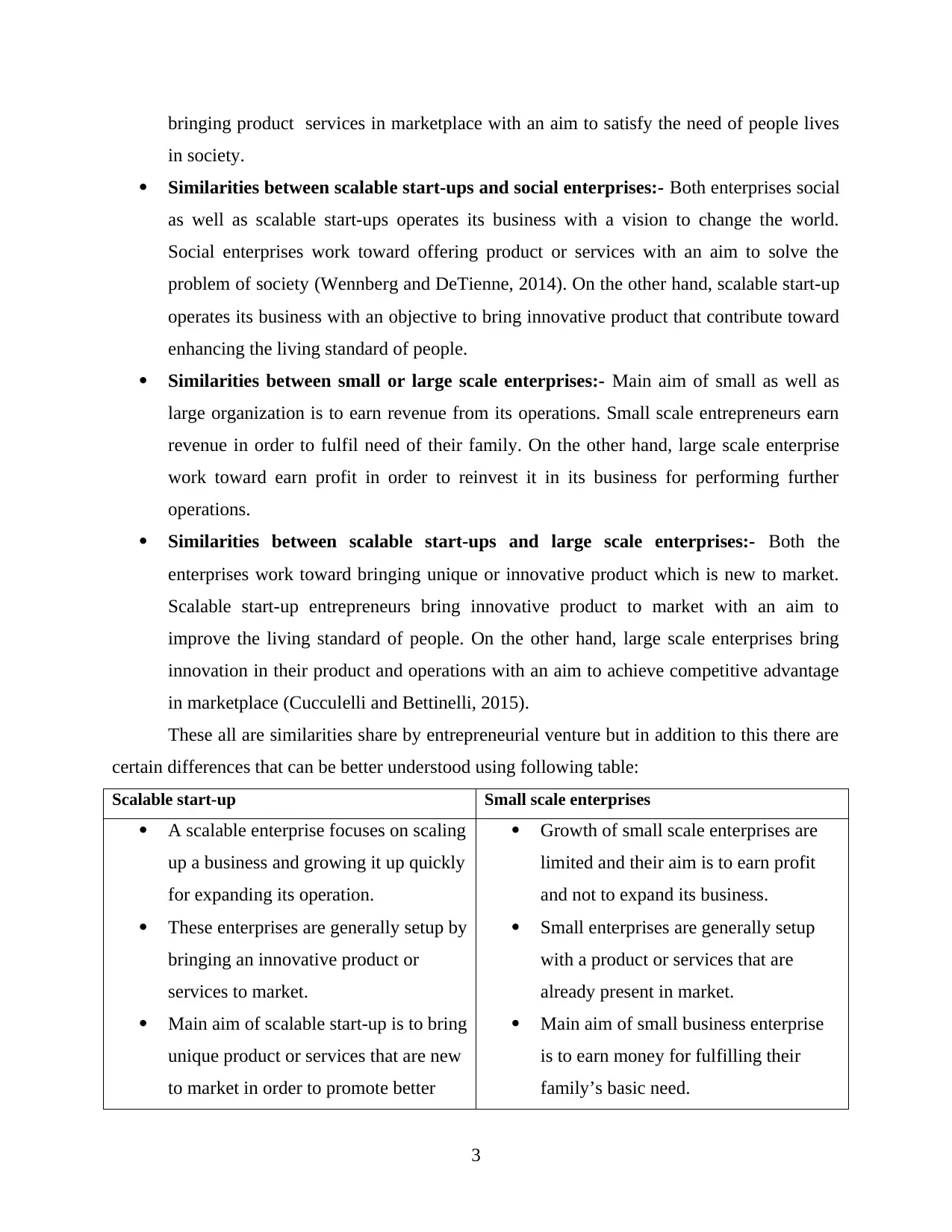
bringing product services in marketplace with an aim to satisfy the need of people lives
in society.
Similarities between scalable start-ups and social enterprises:- Both enterprises social
as well as scalable start-ups operates its business with a vision to change the world.
Social enterprises work toward offering product or services with an aim to solve the
problem of society (Wennberg and DeTienne, 2014). On the other hand, scalable start-up
operates its business with an objective to bring innovative product that contribute toward
enhancing the living standard of people.
Similarities between small or large scale enterprises:- Main aim of small as well as
large organization is to earn revenue from its operations. Small scale entrepreneurs earn
revenue in order to fulfil need of their family. On the other hand, large scale enterprise
work toward earn profit in order to reinvest it in its business for performing further
operations.
Similarities between scalable start-ups and large scale enterprises:- Both the
enterprises work toward bringing unique or innovative product which is new to market.
Scalable start-up entrepreneurs bring innovative product to market with an aim to
improve the living standard of people. On the other hand, large scale enterprises bring
innovation in their product and operations with an aim to achieve competitive advantage
in marketplace (Cucculelli and Bettinelli, 2015).
These all are similarities share by entrepreneurial venture but in addition to this there are
certain differences that can be better understood using following table:
Scalable start-up Small scale enterprises
A scalable enterprise focuses on scaling
up a business and growing it up quickly
for expanding its operation.
These enterprises are generally setup by
bringing an innovative product or
services to market.
Main aim of scalable start-up is to bring
unique product or services that are new
to market in order to promote better
Growth of small scale enterprises are
limited and their aim is to earn profit
and not to expand its business.
Small enterprises are generally setup
with a product or services that are
already present in market.
Main aim of small business enterprise
is to earn money for fulfilling their
family’s basic need.
3
in society.
Similarities between scalable start-ups and social enterprises:- Both enterprises social
as well as scalable start-ups operates its business with a vision to change the world.
Social enterprises work toward offering product or services with an aim to solve the
problem of society (Wennberg and DeTienne, 2014). On the other hand, scalable start-up
operates its business with an objective to bring innovative product that contribute toward
enhancing the living standard of people.
Similarities between small or large scale enterprises:- Main aim of small as well as
large organization is to earn revenue from its operations. Small scale entrepreneurs earn
revenue in order to fulfil need of their family. On the other hand, large scale enterprise
work toward earn profit in order to reinvest it in its business for performing further
operations.
Similarities between scalable start-ups and large scale enterprises:- Both the
enterprises work toward bringing unique or innovative product which is new to market.
Scalable start-up entrepreneurs bring innovative product to market with an aim to
improve the living standard of people. On the other hand, large scale enterprises bring
innovation in their product and operations with an aim to achieve competitive advantage
in marketplace (Cucculelli and Bettinelli, 2015).
These all are similarities share by entrepreneurial venture but in addition to this there are
certain differences that can be better understood using following table:
Scalable start-up Small scale enterprises
A scalable enterprise focuses on scaling
up a business and growing it up quickly
for expanding its operation.
These enterprises are generally setup by
bringing an innovative product or
services to market.
Main aim of scalable start-up is to bring
unique product or services that are new
to market in order to promote better
Growth of small scale enterprises are
limited and their aim is to earn profit
and not to expand its business.
Small enterprises are generally setup
with a product or services that are
already present in market.
Main aim of small business enterprise
is to earn money for fulfilling their
family’s basic need.
3
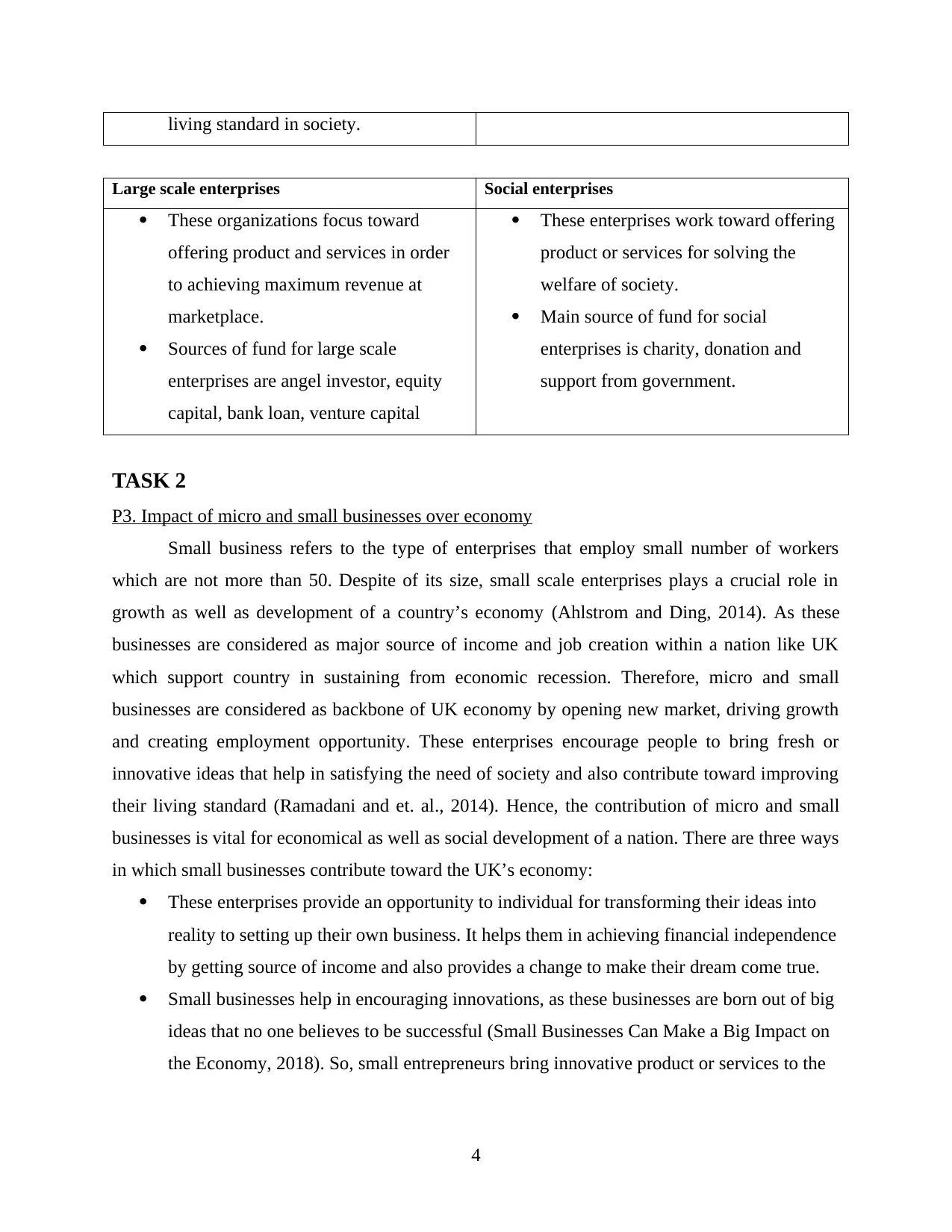
living standard in society.
Large scale enterprises Social enterprises
These organizations focus toward
offering product and services in order
to achieving maximum revenue at
marketplace.
Sources of fund for large scale
enterprises are angel investor, equity
capital, bank loan, venture capital
These enterprises work toward offering
product or services for solving the
welfare of society.
Main source of fund for social
enterprises is charity, donation and
support from government.
TASK 2
P3. Impact of micro and small businesses over economy
Small business refers to the type of enterprises that employ small number of workers
which are not more than 50. Despite of its size, small scale enterprises plays a crucial role in
growth as well as development of a country’s economy (Ahlstrom and Ding, 2014). As these
businesses are considered as major source of income and job creation within a nation like UK
which support country in sustaining from economic recession. Therefore, micro and small
businesses are considered as backbone of UK economy by opening new market, driving growth
and creating employment opportunity. These enterprises encourage people to bring fresh or
innovative ideas that help in satisfying the need of society and also contribute toward improving
their living standard (Ramadani and et. al., 2014). Hence, the contribution of micro and small
businesses is vital for economical as well as social development of a nation. There are three ways
in which small businesses contribute toward the UK’s economy:
These enterprises provide an opportunity to individual for transforming their ideas into
reality to setting up their own business. It helps them in achieving financial independence
by getting source of income and also provides a change to make their dream come true.
Small businesses help in encouraging innovations, as these businesses are born out of big
ideas that no one believes to be successful (Small Businesses Can Make a Big Impact on
the Economy, 2018). So, small entrepreneurs bring innovative product or services to the
4
Large scale enterprises Social enterprises
These organizations focus toward
offering product and services in order
to achieving maximum revenue at
marketplace.
Sources of fund for large scale
enterprises are angel investor, equity
capital, bank loan, venture capital
These enterprises work toward offering
product or services for solving the
welfare of society.
Main source of fund for social
enterprises is charity, donation and
support from government.
TASK 2
P3. Impact of micro and small businesses over economy
Small business refers to the type of enterprises that employ small number of workers
which are not more than 50. Despite of its size, small scale enterprises plays a crucial role in
growth as well as development of a country’s economy (Ahlstrom and Ding, 2014). As these
businesses are considered as major source of income and job creation within a nation like UK
which support country in sustaining from economic recession. Therefore, micro and small
businesses are considered as backbone of UK economy by opening new market, driving growth
and creating employment opportunity. These enterprises encourage people to bring fresh or
innovative ideas that help in satisfying the need of society and also contribute toward improving
their living standard (Ramadani and et. al., 2014). Hence, the contribution of micro and small
businesses is vital for economical as well as social development of a nation. There are three ways
in which small businesses contribute toward the UK’s economy:
These enterprises provide an opportunity to individual for transforming their ideas into
reality to setting up their own business. It helps them in achieving financial independence
by getting source of income and also provides a change to make their dream come true.
Small businesses help in encouraging innovations, as these businesses are born out of big
ideas that no one believes to be successful (Small Businesses Can Make a Big Impact on
the Economy, 2018). So, small entrepreneurs bring innovative product or services to the
4
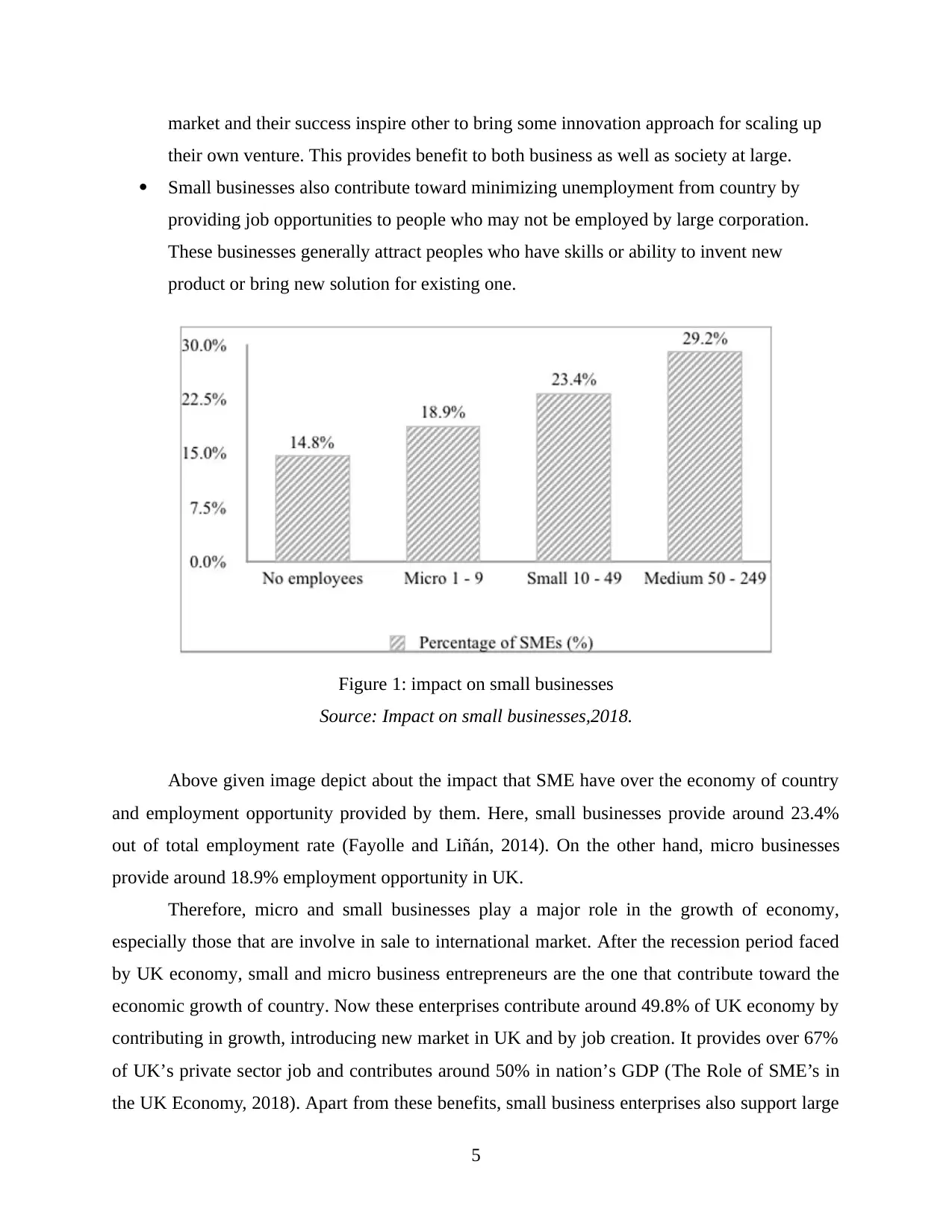
market and their success inspire other to bring some innovation approach for scaling up
their own venture. This provides benefit to both business as well as society at large.
Small businesses also contribute toward minimizing unemployment from country by
providing job opportunities to people who may not be employed by large corporation.
These businesses generally attract peoples who have skills or ability to invent new
product or bring new solution for existing one.
Figure 1: impact on small businesses
Source: Impact on small businesses,2018.
Above given image depict about the impact that SME have over the economy of country
and employment opportunity provided by them. Here, small businesses provide around 23.4%
out of total employment rate (Fayolle and Liñán, 2014). On the other hand, micro businesses
provide around 18.9% employment opportunity in UK.
Therefore, micro and small businesses play a major role in the growth of economy,
especially those that are involve in sale to international market. After the recession period faced
by UK economy, small and micro business entrepreneurs are the one that contribute toward the
economic growth of country. Now these enterprises contribute around 49.8% of UK economy by
contributing in growth, introducing new market in UK and by job creation. It provides over 67%
of UK’s private sector job and contributes around 50% in nation’s GDP (The Role of SME’s in
the UK Economy, 2018). Apart from these benefits, small business enterprises also support large
5
their own venture. This provides benefit to both business as well as society at large.
Small businesses also contribute toward minimizing unemployment from country by
providing job opportunities to people who may not be employed by large corporation.
These businesses generally attract peoples who have skills or ability to invent new
product or bring new solution for existing one.
Figure 1: impact on small businesses
Source: Impact on small businesses,2018.
Above given image depict about the impact that SME have over the economy of country
and employment opportunity provided by them. Here, small businesses provide around 23.4%
out of total employment rate (Fayolle and Liñán, 2014). On the other hand, micro businesses
provide around 18.9% employment opportunity in UK.
Therefore, micro and small businesses play a major role in the growth of economy,
especially those that are involve in sale to international market. After the recession period faced
by UK economy, small and micro business entrepreneurs are the one that contribute toward the
economic growth of country. Now these enterprises contribute around 49.8% of UK economy by
contributing in growth, introducing new market in UK and by job creation. It provides over 67%
of UK’s private sector job and contributes around 50% in nation’s GDP (The Role of SME’s in
the UK Economy, 2018). Apart from these benefits, small business enterprises also support large
5
Paraphrase This Document
Need a fresh take? Get an instant paraphrase of this document with our AI Paraphraser
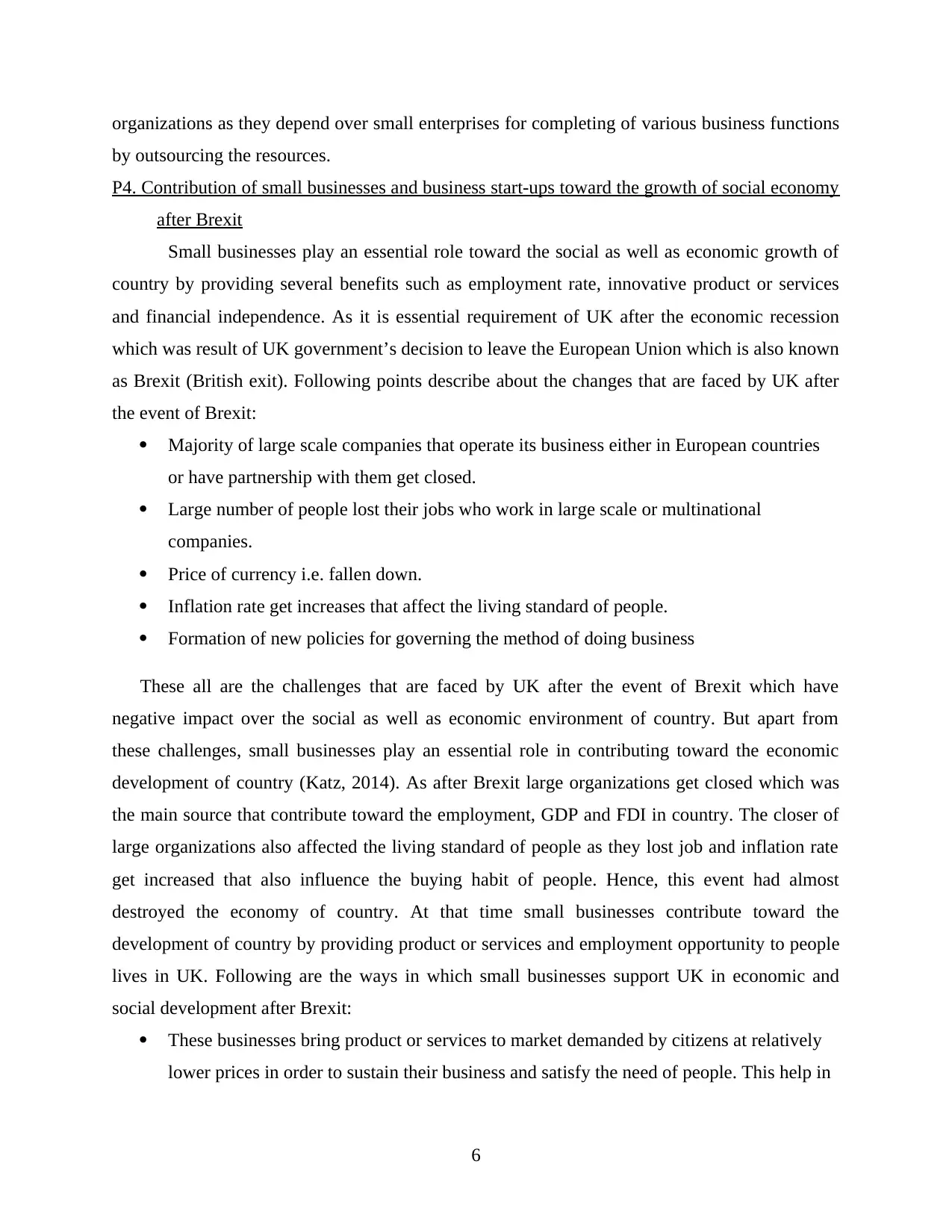
organizations as they depend over small enterprises for completing of various business functions
by outsourcing the resources.
P4. Contribution of small businesses and business start-ups toward the growth of social economy
after Brexit
Small businesses play an essential role toward the social as well as economic growth of
country by providing several benefits such as employment rate, innovative product or services
and financial independence. As it is essential requirement of UK after the economic recession
which was result of UK government’s decision to leave the European Union which is also known
as Brexit (British exit). Following points describe about the changes that are faced by UK after
the event of Brexit:
Majority of large scale companies that operate its business either in European countries
or have partnership with them get closed.
Large number of people lost their jobs who work in large scale or multinational
companies.
Price of currency i.e. fallen down.
Inflation rate get increases that affect the living standard of people.
Formation of new policies for governing the method of doing business
These all are the challenges that are faced by UK after the event of Brexit which have
negative impact over the social as well as economic environment of country. But apart from
these challenges, small businesses play an essential role in contributing toward the economic
development of country (Katz, 2014). As after Brexit large organizations get closed which was
the main source that contribute toward the employment, GDP and FDI in country. The closer of
large organizations also affected the living standard of people as they lost job and inflation rate
get increased that also influence the buying habit of people. Hence, this event had almost
destroyed the economy of country. At that time small businesses contribute toward the
development of country by providing product or services and employment opportunity to people
lives in UK. Following are the ways in which small businesses support UK in economic and
social development after Brexit:
These businesses bring product or services to market demanded by citizens at relatively
lower prices in order to sustain their business and satisfy the need of people. This help in
6
by outsourcing the resources.
P4. Contribution of small businesses and business start-ups toward the growth of social economy
after Brexit
Small businesses play an essential role toward the social as well as economic growth of
country by providing several benefits such as employment rate, innovative product or services
and financial independence. As it is essential requirement of UK after the economic recession
which was result of UK government’s decision to leave the European Union which is also known
as Brexit (British exit). Following points describe about the changes that are faced by UK after
the event of Brexit:
Majority of large scale companies that operate its business either in European countries
or have partnership with them get closed.
Large number of people lost their jobs who work in large scale or multinational
companies.
Price of currency i.e. fallen down.
Inflation rate get increases that affect the living standard of people.
Formation of new policies for governing the method of doing business
These all are the challenges that are faced by UK after the event of Brexit which have
negative impact over the social as well as economic environment of country. But apart from
these challenges, small businesses play an essential role in contributing toward the economic
development of country (Katz, 2014). As after Brexit large organizations get closed which was
the main source that contribute toward the employment, GDP and FDI in country. The closer of
large organizations also affected the living standard of people as they lost job and inflation rate
get increased that also influence the buying habit of people. Hence, this event had almost
destroyed the economy of country. At that time small businesses contribute toward the
development of country by providing product or services and employment opportunity to people
lives in UK. Following are the ways in which small businesses support UK in economic and
social development after Brexit:
These businesses bring product or services to market demanded by citizens at relatively
lower prices in order to sustain their business and satisfy the need of people. This help in
6
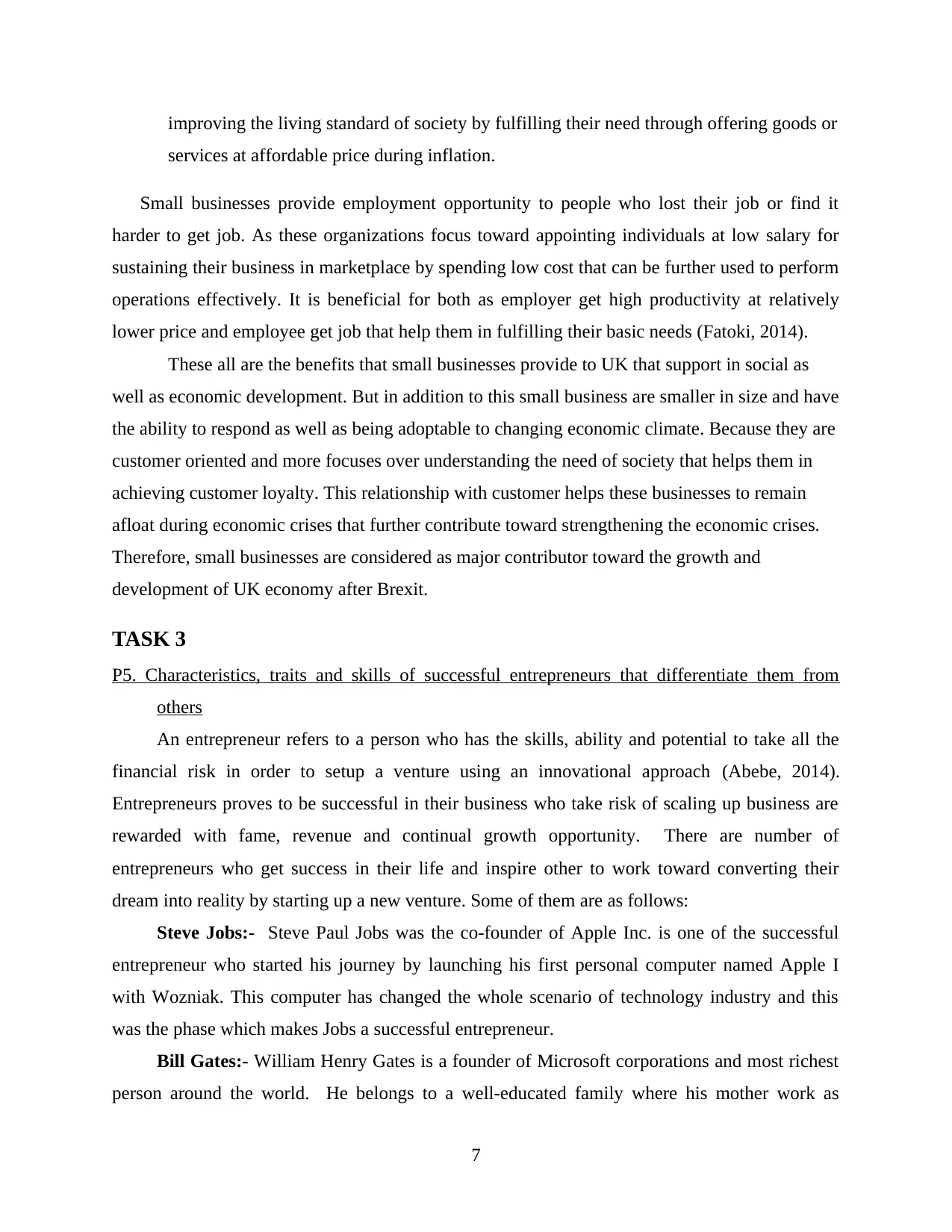
improving the living standard of society by fulfilling their need through offering goods or
services at affordable price during inflation.
Small businesses provide employment opportunity to people who lost their job or find it
harder to get job. As these organizations focus toward appointing individuals at low salary for
sustaining their business in marketplace by spending low cost that can be further used to perform
operations effectively. It is beneficial for both as employer get high productivity at relatively
lower price and employee get job that help them in fulfilling their basic needs (Fatoki, 2014).
These all are the benefits that small businesses provide to UK that support in social as
well as economic development. But in addition to this small business are smaller in size and have
the ability to respond as well as being adoptable to changing economic climate. Because they are
customer oriented and more focuses over understanding the need of society that helps them in
achieving customer loyalty. This relationship with customer helps these businesses to remain
afloat during economic crises that further contribute toward strengthening the economic crises.
Therefore, small businesses are considered as major contributor toward the growth and
development of UK economy after Brexit.
TASK 3
P5. Characteristics, traits and skills of successful entrepreneurs that differentiate them from
others
An entrepreneur refers to a person who has the skills, ability and potential to take all the
financial risk in order to setup a venture using an innovational approach (Abebe, 2014).
Entrepreneurs proves to be successful in their business who take risk of scaling up business are
rewarded with fame, revenue and continual growth opportunity. There are number of
entrepreneurs who get success in their life and inspire other to work toward converting their
dream into reality by starting up a new venture. Some of them are as follows:
Steve Jobs:- Steve Paul Jobs was the co-founder of Apple Inc. is one of the successful
entrepreneur who started his journey by launching his first personal computer named Apple I
with Wozniak. This computer has changed the whole scenario of technology industry and this
was the phase which makes Jobs a successful entrepreneur.
Bill Gates:- William Henry Gates is a founder of Microsoft corporations and most richest
person around the world. He belongs to a well-educated family where his mother work as
7
services at affordable price during inflation.
Small businesses provide employment opportunity to people who lost their job or find it
harder to get job. As these organizations focus toward appointing individuals at low salary for
sustaining their business in marketplace by spending low cost that can be further used to perform
operations effectively. It is beneficial for both as employer get high productivity at relatively
lower price and employee get job that help them in fulfilling their basic needs (Fatoki, 2014).
These all are the benefits that small businesses provide to UK that support in social as
well as economic development. But in addition to this small business are smaller in size and have
the ability to respond as well as being adoptable to changing economic climate. Because they are
customer oriented and more focuses over understanding the need of society that helps them in
achieving customer loyalty. This relationship with customer helps these businesses to remain
afloat during economic crises that further contribute toward strengthening the economic crises.
Therefore, small businesses are considered as major contributor toward the growth and
development of UK economy after Brexit.
TASK 3
P5. Characteristics, traits and skills of successful entrepreneurs that differentiate them from
others
An entrepreneur refers to a person who has the skills, ability and potential to take all the
financial risk in order to setup a venture using an innovational approach (Abebe, 2014).
Entrepreneurs proves to be successful in their business who take risk of scaling up business are
rewarded with fame, revenue and continual growth opportunity. There are number of
entrepreneurs who get success in their life and inspire other to work toward converting their
dream into reality by starting up a new venture. Some of them are as follows:
Steve Jobs:- Steve Paul Jobs was the co-founder of Apple Inc. is one of the successful
entrepreneur who started his journey by launching his first personal computer named Apple I
with Wozniak. This computer has changed the whole scenario of technology industry and this
was the phase which makes Jobs a successful entrepreneur.
Bill Gates:- William Henry Gates is a founder of Microsoft corporations and most richest
person around the world. He belongs to a well-educated family where his mother work as
7
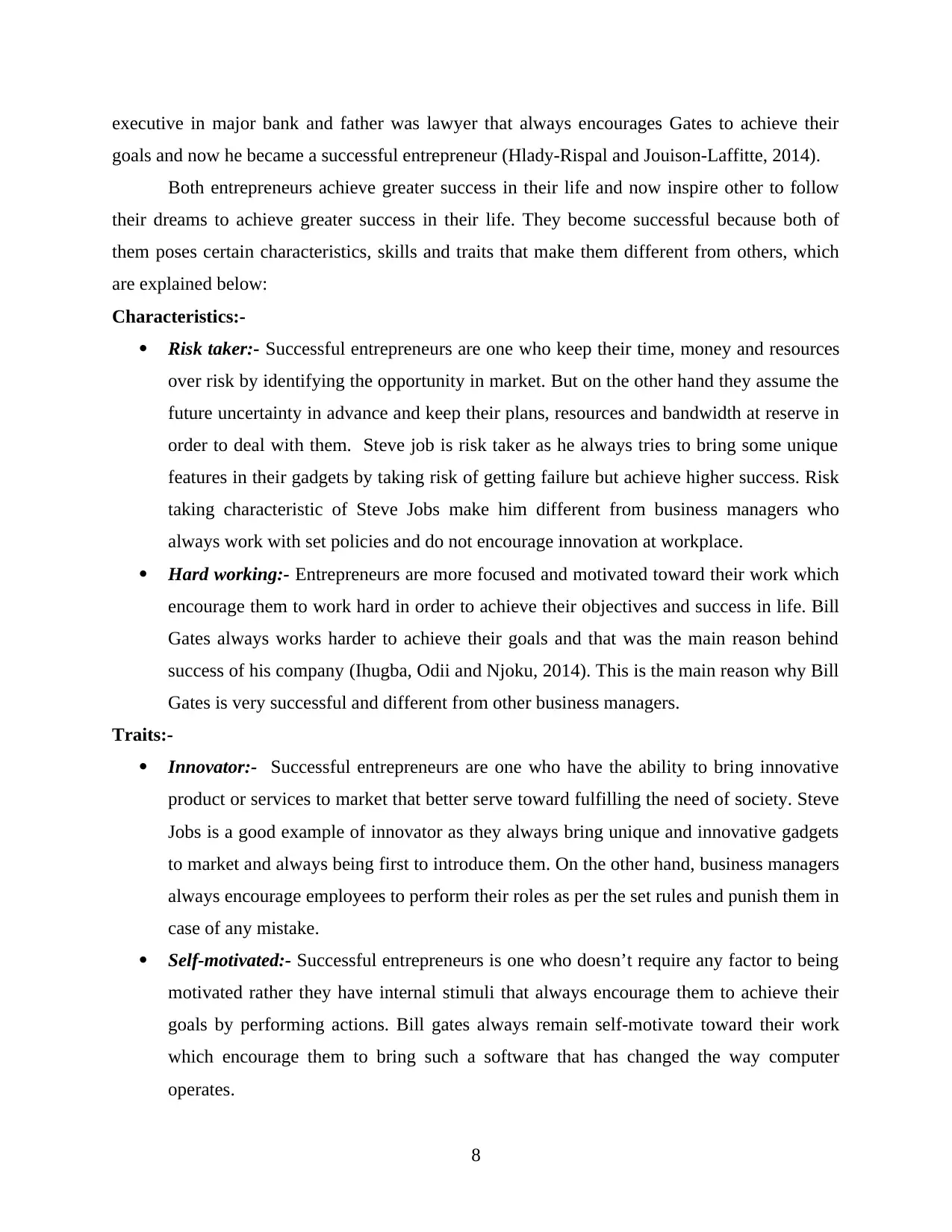
executive in major bank and father was lawyer that always encourages Gates to achieve their
goals and now he became a successful entrepreneur (Hlady‐Rispal and Jouison‐Laffitte, 2014).
Both entrepreneurs achieve greater success in their life and now inspire other to follow
their dreams to achieve greater success in their life. They become successful because both of
them poses certain characteristics, skills and traits that make them different from others, which
are explained below:
Characteristics:-
Risk taker:- Successful entrepreneurs are one who keep their time, money and resources
over risk by identifying the opportunity in market. But on the other hand they assume the
future uncertainty in advance and keep their plans, resources and bandwidth at reserve in
order to deal with them. Steve job is risk taker as he always tries to bring some unique
features in their gadgets by taking risk of getting failure but achieve higher success. Risk
taking characteristic of Steve Jobs make him different from business managers who
always work with set policies and do not encourage innovation at workplace.
Hard working:- Entrepreneurs are more focused and motivated toward their work which
encourage them to work hard in order to achieve their objectives and success in life. Bill
Gates always works harder to achieve their goals and that was the main reason behind
success of his company (Ihugba, Odii and Njoku, 2014). This is the main reason why Bill
Gates is very successful and different from other business managers.
Traits:-
Innovator:- Successful entrepreneurs are one who have the ability to bring innovative
product or services to market that better serve toward fulfilling the need of society. Steve
Jobs is a good example of innovator as they always bring unique and innovative gadgets
to market and always being first to introduce them. On the other hand, business managers
always encourage employees to perform their roles as per the set rules and punish them in
case of any mistake.
Self-motivated:- Successful entrepreneurs is one who doesn’t require any factor to being
motivated rather they have internal stimuli that always encourage them to achieve their
goals by performing actions. Bill gates always remain self-motivate toward their work
which encourage them to bring such a software that has changed the way computer
operates.
8
goals and now he became a successful entrepreneur (Hlady‐Rispal and Jouison‐Laffitte, 2014).
Both entrepreneurs achieve greater success in their life and now inspire other to follow
their dreams to achieve greater success in their life. They become successful because both of
them poses certain characteristics, skills and traits that make them different from others, which
are explained below:
Characteristics:-
Risk taker:- Successful entrepreneurs are one who keep their time, money and resources
over risk by identifying the opportunity in market. But on the other hand they assume the
future uncertainty in advance and keep their plans, resources and bandwidth at reserve in
order to deal with them. Steve job is risk taker as he always tries to bring some unique
features in their gadgets by taking risk of getting failure but achieve higher success. Risk
taking characteristic of Steve Jobs make him different from business managers who
always work with set policies and do not encourage innovation at workplace.
Hard working:- Entrepreneurs are more focused and motivated toward their work which
encourage them to work hard in order to achieve their objectives and success in life. Bill
Gates always works harder to achieve their goals and that was the main reason behind
success of his company (Ihugba, Odii and Njoku, 2014). This is the main reason why Bill
Gates is very successful and different from other business managers.
Traits:-
Innovator:- Successful entrepreneurs are one who have the ability to bring innovative
product or services to market that better serve toward fulfilling the need of society. Steve
Jobs is a good example of innovator as they always bring unique and innovative gadgets
to market and always being first to introduce them. On the other hand, business managers
always encourage employees to perform their roles as per the set rules and punish them in
case of any mistake.
Self-motivated:- Successful entrepreneurs is one who doesn’t require any factor to being
motivated rather they have internal stimuli that always encourage them to achieve their
goals by performing actions. Bill gates always remain self-motivate toward their work
which encourage them to bring such a software that has changed the way computer
operates.
8
Secure Best Marks with AI Grader
Need help grading? Try our AI Grader for instant feedback on your assignments.
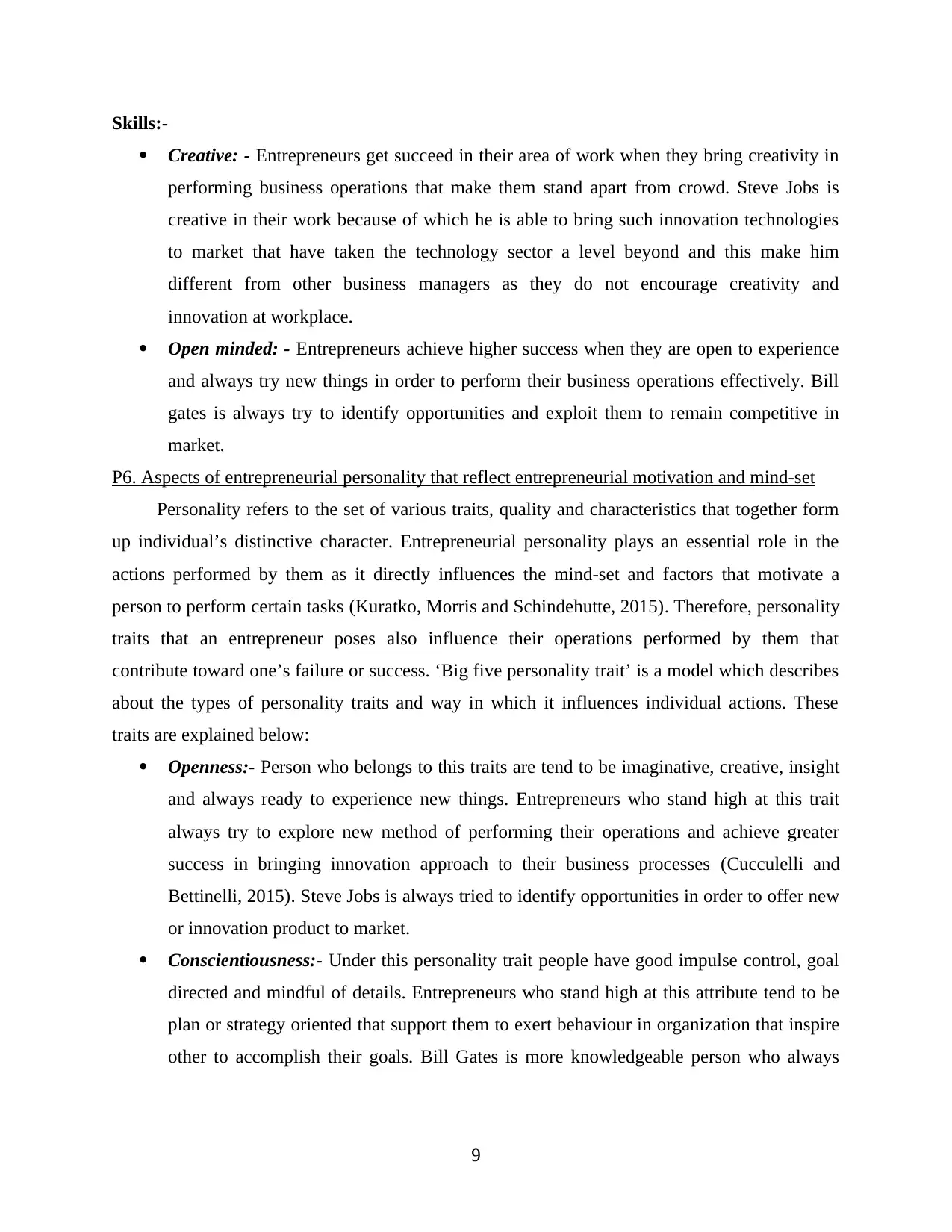
Skills:-
Creative: - Entrepreneurs get succeed in their area of work when they bring creativity in
performing business operations that make them stand apart from crowd. Steve Jobs is
creative in their work because of which he is able to bring such innovation technologies
to market that have taken the technology sector a level beyond and this make him
different from other business managers as they do not encourage creativity and
innovation at workplace.
Open minded: - Entrepreneurs achieve higher success when they are open to experience
and always try new things in order to perform their business operations effectively. Bill
gates is always try to identify opportunities and exploit them to remain competitive in
market.
P6. Aspects of entrepreneurial personality that reflect entrepreneurial motivation and mind-set
Personality refers to the set of various traits, quality and characteristics that together form
up individual’s distinctive character. Entrepreneurial personality plays an essential role in the
actions performed by them as it directly influences the mind-set and factors that motivate a
person to perform certain tasks (Kuratko, Morris and Schindehutte, 2015). Therefore, personality
traits that an entrepreneur poses also influence their operations performed by them that
contribute toward one’s failure or success. ‘Big five personality trait’ is a model which describes
about the types of personality traits and way in which it influences individual actions. These
traits are explained below:
Openness:- Person who belongs to this traits are tend to be imaginative, creative, insight
and always ready to experience new things. Entrepreneurs who stand high at this trait
always try to explore new method of performing their operations and achieve greater
success in bringing innovation approach to their business processes (Cucculelli and
Bettinelli, 2015). Steve Jobs is always tried to identify opportunities in order to offer new
or innovation product to market.
Conscientiousness:- Under this personality trait people have good impulse control, goal
directed and mindful of details. Entrepreneurs who stand high at this attribute tend to be
plan or strategy oriented that support them to exert behaviour in organization that inspire
other to accomplish their goals. Bill Gates is more knowledgeable person who always
9
Creative: - Entrepreneurs get succeed in their area of work when they bring creativity in
performing business operations that make them stand apart from crowd. Steve Jobs is
creative in their work because of which he is able to bring such innovation technologies
to market that have taken the technology sector a level beyond and this make him
different from other business managers as they do not encourage creativity and
innovation at workplace.
Open minded: - Entrepreneurs achieve higher success when they are open to experience
and always try new things in order to perform their business operations effectively. Bill
gates is always try to identify opportunities and exploit them to remain competitive in
market.
P6. Aspects of entrepreneurial personality that reflect entrepreneurial motivation and mind-set
Personality refers to the set of various traits, quality and characteristics that together form
up individual’s distinctive character. Entrepreneurial personality plays an essential role in the
actions performed by them as it directly influences the mind-set and factors that motivate a
person to perform certain tasks (Kuratko, Morris and Schindehutte, 2015). Therefore, personality
traits that an entrepreneur poses also influence their operations performed by them that
contribute toward one’s failure or success. ‘Big five personality trait’ is a model which describes
about the types of personality traits and way in which it influences individual actions. These
traits are explained below:
Openness:- Person who belongs to this traits are tend to be imaginative, creative, insight
and always ready to experience new things. Entrepreneurs who stand high at this trait
always try to explore new method of performing their operations and achieve greater
success in bringing innovation approach to their business processes (Cucculelli and
Bettinelli, 2015). Steve Jobs is always tried to identify opportunities in order to offer new
or innovation product to market.
Conscientiousness:- Under this personality trait people have good impulse control, goal
directed and mindful of details. Entrepreneurs who stand high at this attribute tend to be
plan or strategy oriented that support them to exert behaviour in organization that inspire
other to accomplish their goals. Bill Gates is more knowledgeable person who always
9
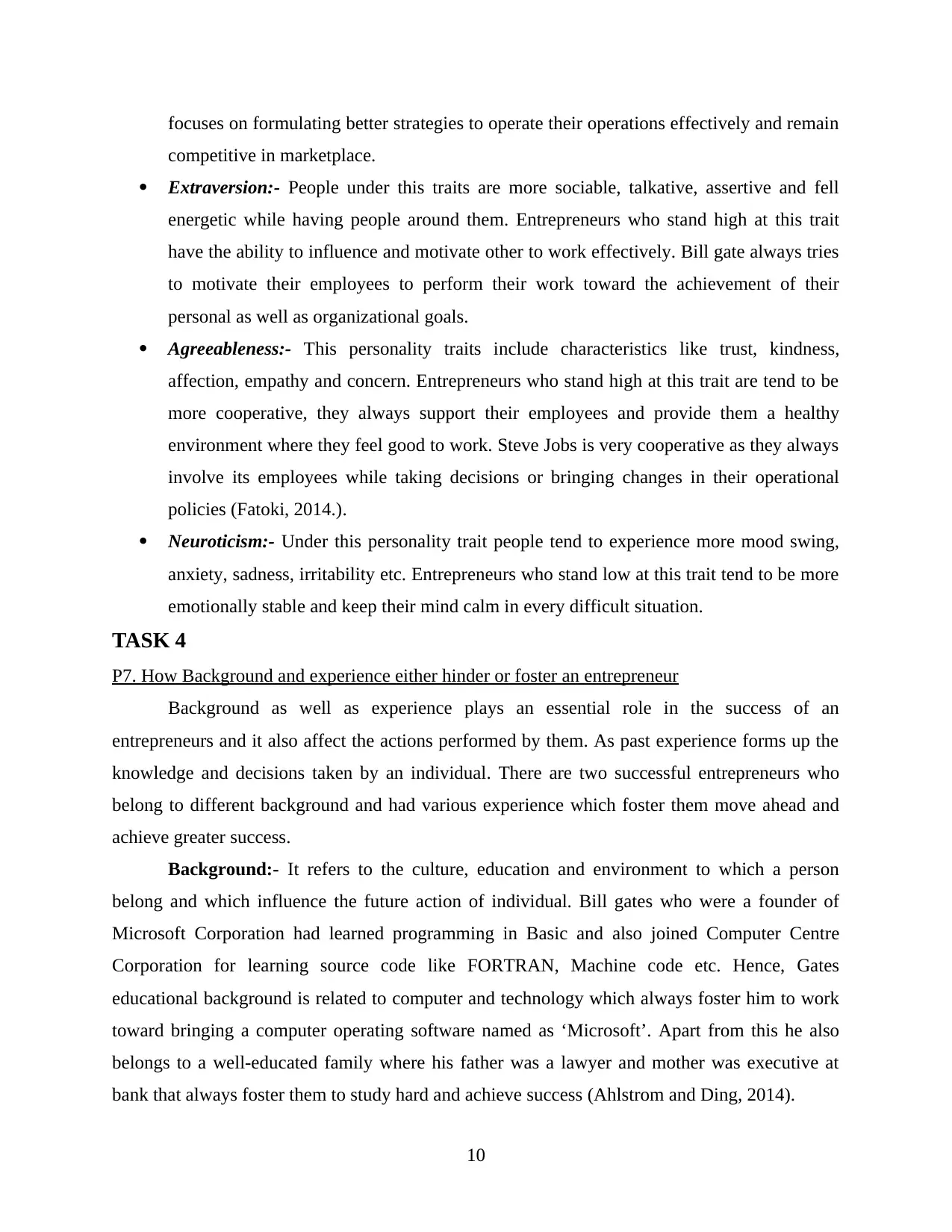
focuses on formulating better strategies to operate their operations effectively and remain
competitive in marketplace.
Extraversion:- People under this traits are more sociable, talkative, assertive and fell
energetic while having people around them. Entrepreneurs who stand high at this trait
have the ability to influence and motivate other to work effectively. Bill gate always tries
to motivate their employees to perform their work toward the achievement of their
personal as well as organizational goals.
Agreeableness:- This personality traits include characteristics like trust, kindness,
affection, empathy and concern. Entrepreneurs who stand high at this trait are tend to be
more cooperative, they always support their employees and provide them a healthy
environment where they feel good to work. Steve Jobs is very cooperative as they always
involve its employees while taking decisions or bringing changes in their operational
policies (Fatoki, 2014.).
Neuroticism:- Under this personality trait people tend to experience more mood swing,
anxiety, sadness, irritability etc. Entrepreneurs who stand low at this trait tend to be more
emotionally stable and keep their mind calm in every difficult situation.
TASK 4
P7. How Background and experience either hinder or foster an entrepreneur
Background as well as experience plays an essential role in the success of an
entrepreneurs and it also affect the actions performed by them. As past experience forms up the
knowledge and decisions taken by an individual. There are two successful entrepreneurs who
belong to different background and had various experience which foster them move ahead and
achieve greater success.
Background:- It refers to the culture, education and environment to which a person
belong and which influence the future action of individual. Bill gates who were a founder of
Microsoft Corporation had learned programming in Basic and also joined Computer Centre
Corporation for learning source code like FORTRAN, Machine code etc. Hence, Gates
educational background is related to computer and technology which always foster him to work
toward bringing a computer operating software named as ‘Microsoft’. Apart from this he also
belongs to a well-educated family where his father was a lawyer and mother was executive at
bank that always foster them to study hard and achieve success (Ahlstrom and Ding, 2014).
10
competitive in marketplace.
Extraversion:- People under this traits are more sociable, talkative, assertive and fell
energetic while having people around them. Entrepreneurs who stand high at this trait
have the ability to influence and motivate other to work effectively. Bill gate always tries
to motivate their employees to perform their work toward the achievement of their
personal as well as organizational goals.
Agreeableness:- This personality traits include characteristics like trust, kindness,
affection, empathy and concern. Entrepreneurs who stand high at this trait are tend to be
more cooperative, they always support their employees and provide them a healthy
environment where they feel good to work. Steve Jobs is very cooperative as they always
involve its employees while taking decisions or bringing changes in their operational
policies (Fatoki, 2014.).
Neuroticism:- Under this personality trait people tend to experience more mood swing,
anxiety, sadness, irritability etc. Entrepreneurs who stand low at this trait tend to be more
emotionally stable and keep their mind calm in every difficult situation.
TASK 4
P7. How Background and experience either hinder or foster an entrepreneur
Background as well as experience plays an essential role in the success of an
entrepreneurs and it also affect the actions performed by them. As past experience forms up the
knowledge and decisions taken by an individual. There are two successful entrepreneurs who
belong to different background and had various experience which foster them move ahead and
achieve greater success.
Background:- It refers to the culture, education and environment to which a person
belong and which influence the future action of individual. Bill gates who were a founder of
Microsoft Corporation had learned programming in Basic and also joined Computer Centre
Corporation for learning source code like FORTRAN, Machine code etc. Hence, Gates
educational background is related to computer and technology which always foster him to work
toward bringing a computer operating software named as ‘Microsoft’. Apart from this he also
belongs to a well-educated family where his father was a lawyer and mother was executive at
bank that always foster them to study hard and achieve success (Ahlstrom and Ding, 2014).
10
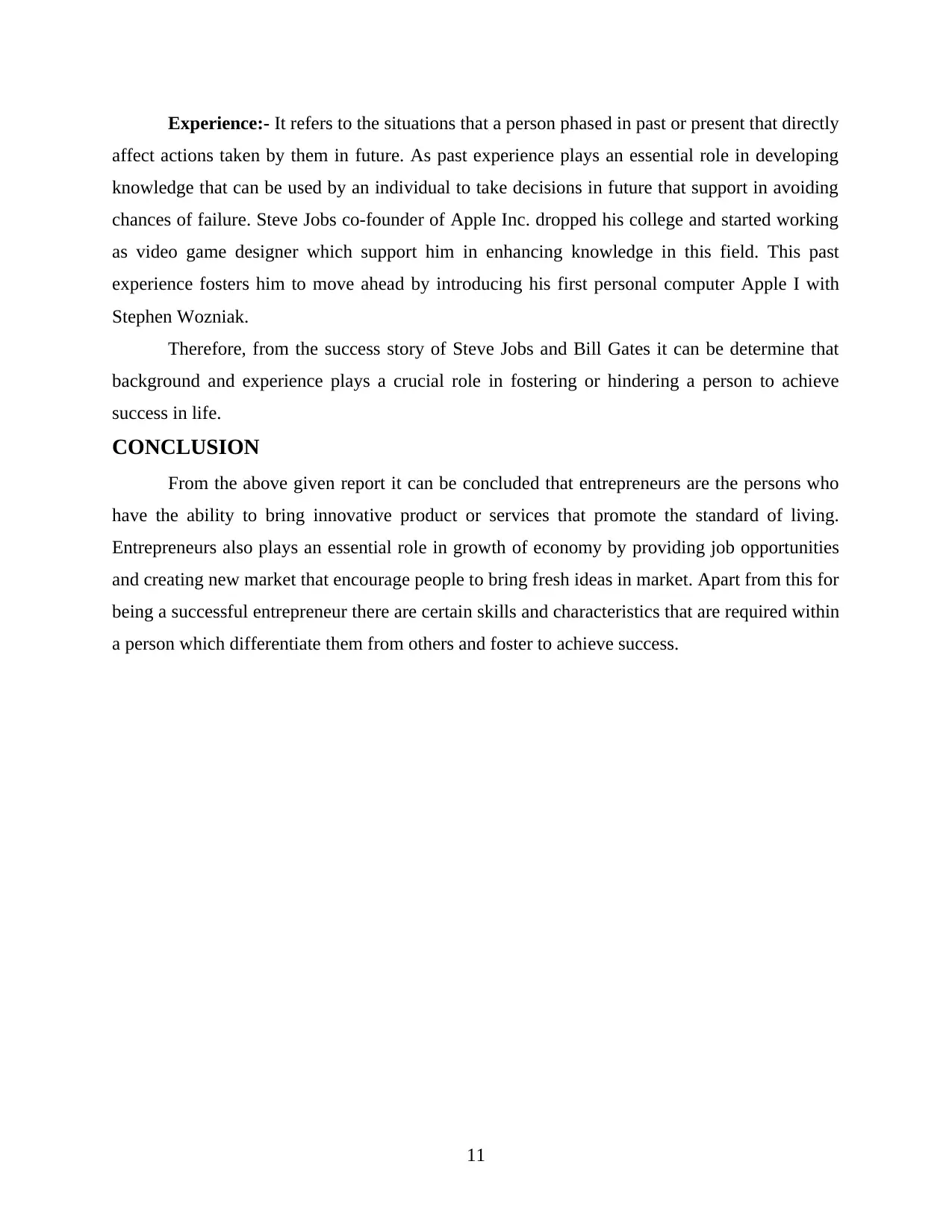
Experience:- It refers to the situations that a person phased in past or present that directly
affect actions taken by them in future. As past experience plays an essential role in developing
knowledge that can be used by an individual to take decisions in future that support in avoiding
chances of failure. Steve Jobs co-founder of Apple Inc. dropped his college and started working
as video game designer which support him in enhancing knowledge in this field. This past
experience fosters him to move ahead by introducing his first personal computer Apple I with
Stephen Wozniak.
Therefore, from the success story of Steve Jobs and Bill Gates it can be determine that
background and experience plays a crucial role in fostering or hindering a person to achieve
success in life.
CONCLUSION
From the above given report it can be concluded that entrepreneurs are the persons who
have the ability to bring innovative product or services that promote the standard of living.
Entrepreneurs also plays an essential role in growth of economy by providing job opportunities
and creating new market that encourage people to bring fresh ideas in market. Apart from this for
being a successful entrepreneur there are certain skills and characteristics that are required within
a person which differentiate them from others and foster to achieve success.
11
affect actions taken by them in future. As past experience plays an essential role in developing
knowledge that can be used by an individual to take decisions in future that support in avoiding
chances of failure. Steve Jobs co-founder of Apple Inc. dropped his college and started working
as video game designer which support him in enhancing knowledge in this field. This past
experience fosters him to move ahead by introducing his first personal computer Apple I with
Stephen Wozniak.
Therefore, from the success story of Steve Jobs and Bill Gates it can be determine that
background and experience plays a crucial role in fostering or hindering a person to achieve
success in life.
CONCLUSION
From the above given report it can be concluded that entrepreneurs are the persons who
have the ability to bring innovative product or services that promote the standard of living.
Entrepreneurs also plays an essential role in growth of economy by providing job opportunities
and creating new market that encourage people to bring fresh ideas in market. Apart from this for
being a successful entrepreneur there are certain skills and characteristics that are required within
a person which differentiate them from others and foster to achieve success.
11
Paraphrase This Document
Need a fresh take? Get an instant paraphrase of this document with our AI Paraphraser
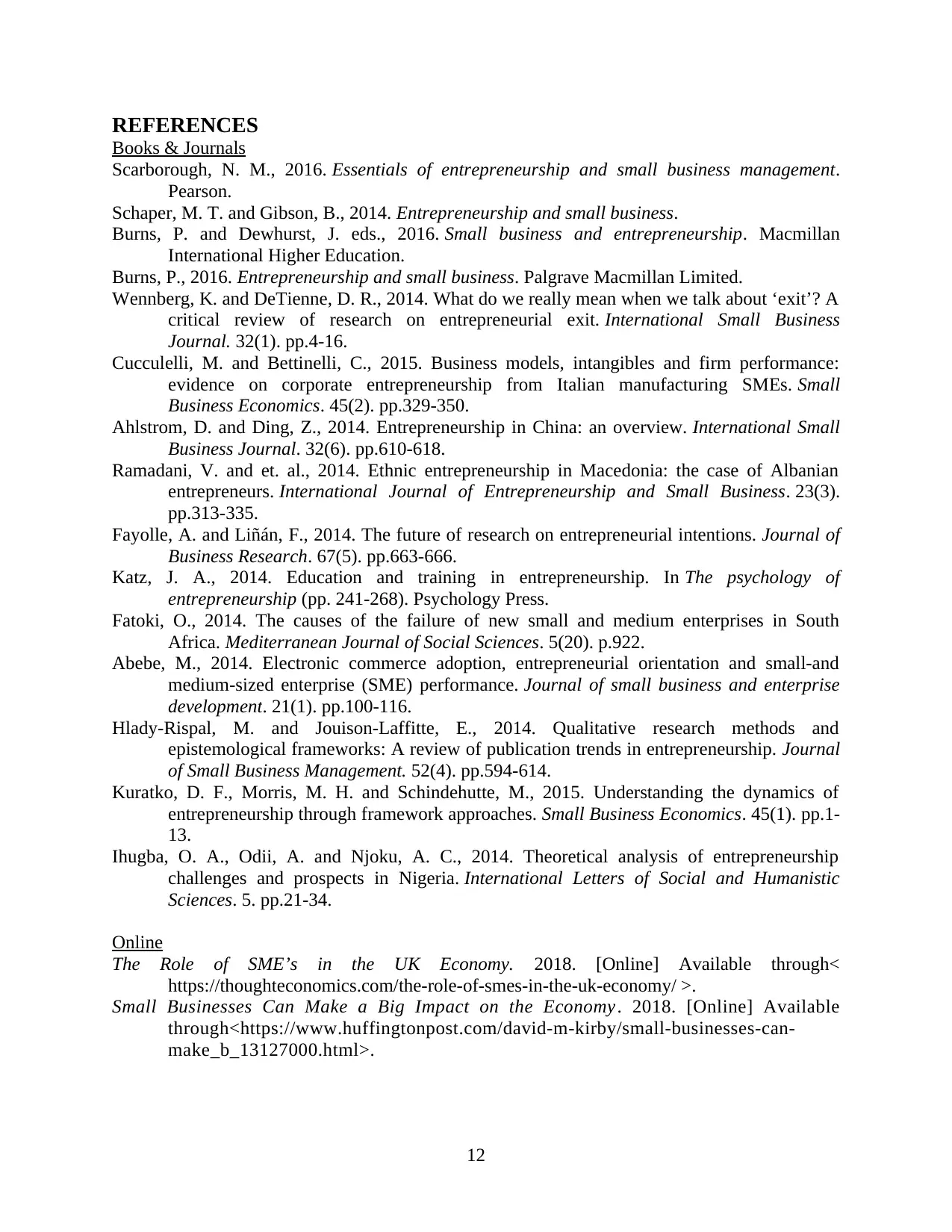
REFERENCES
Books & Journals
Scarborough, N. M., 2016. Essentials of entrepreneurship and small business management.
Pearson.
Schaper, M. T. and Gibson, B., 2014. Entrepreneurship and small business.
Burns, P. and Dewhurst, J. eds., 2016. Small business and entrepreneurship. Macmillan
International Higher Education.
Burns, P., 2016. Entrepreneurship and small business. Palgrave Macmillan Limited.
Wennberg, K. and DeTienne, D. R., 2014. What do we really mean when we talk about ‘exit’? A
critical review of research on entrepreneurial exit. International Small Business
Journal. 32(1). pp.4-16.
Cucculelli, M. and Bettinelli, C., 2015. Business models, intangibles and firm performance:
evidence on corporate entrepreneurship from Italian manufacturing SMEs. Small
Business Economics. 45(2). pp.329-350.
Ahlstrom, D. and Ding, Z., 2014. Entrepreneurship in China: an overview. International Small
Business Journal. 32(6). pp.610-618.
Ramadani, V. and et. al., 2014. Ethnic entrepreneurship in Macedonia: the case of Albanian
entrepreneurs. International Journal of Entrepreneurship and Small Business. 23(3).
pp.313-335.
Fayolle, A. and Liñán, F., 2014. The future of research on entrepreneurial intentions. Journal of
Business Research. 67(5). pp.663-666.
Katz, J. A., 2014. Education and training in entrepreneurship. In The psychology of
entrepreneurship (pp. 241-268). Psychology Press.
Fatoki, O., 2014. The causes of the failure of new small and medium enterprises in South
Africa. Mediterranean Journal of Social Sciences. 5(20). p.922.
Abebe, M., 2014. Electronic commerce adoption, entrepreneurial orientation and small-and
medium-sized enterprise (SME) performance. Journal of small business and enterprise
development. 21(1). pp.100-116.
Hlady‐Rispal, M. and Jouison‐Laffitte, E., 2014. Qualitative research methods and
epistemological frameworks: A review of publication trends in entrepreneurship. Journal
of Small Business Management. 52(4). pp.594-614.
Kuratko, D. F., Morris, M. H. and Schindehutte, M., 2015. Understanding the dynamics of
entrepreneurship through framework approaches. Small Business Economics. 45(1). pp.1-
13.
Ihugba, O. A., Odii, A. and Njoku, A. C., 2014. Theoretical analysis of entrepreneurship
challenges and prospects in Nigeria. International Letters of Social and Humanistic
Sciences. 5. pp.21-34.
Online
The Role of SME’s in the UK Economy. 2018. [Online] Available through<
https://thoughteconomics.com/the-role-of-smes-in-the-uk-economy/ >.
Small Businesses Can Make a Big Impact on the Economy. 2018. [Online] Available
through<https://www.huffingtonpost.com/david-m-kirby/small-businesses-can-
make_b_13127000.html>.
12
Books & Journals
Scarborough, N. M., 2016. Essentials of entrepreneurship and small business management.
Pearson.
Schaper, M. T. and Gibson, B., 2014. Entrepreneurship and small business.
Burns, P. and Dewhurst, J. eds., 2016. Small business and entrepreneurship. Macmillan
International Higher Education.
Burns, P., 2016. Entrepreneurship and small business. Palgrave Macmillan Limited.
Wennberg, K. and DeTienne, D. R., 2014. What do we really mean when we talk about ‘exit’? A
critical review of research on entrepreneurial exit. International Small Business
Journal. 32(1). pp.4-16.
Cucculelli, M. and Bettinelli, C., 2015. Business models, intangibles and firm performance:
evidence on corporate entrepreneurship from Italian manufacturing SMEs. Small
Business Economics. 45(2). pp.329-350.
Ahlstrom, D. and Ding, Z., 2014. Entrepreneurship in China: an overview. International Small
Business Journal. 32(6). pp.610-618.
Ramadani, V. and et. al., 2014. Ethnic entrepreneurship in Macedonia: the case of Albanian
entrepreneurs. International Journal of Entrepreneurship and Small Business. 23(3).
pp.313-335.
Fayolle, A. and Liñán, F., 2014. The future of research on entrepreneurial intentions. Journal of
Business Research. 67(5). pp.663-666.
Katz, J. A., 2014. Education and training in entrepreneurship. In The psychology of
entrepreneurship (pp. 241-268). Psychology Press.
Fatoki, O., 2014. The causes of the failure of new small and medium enterprises in South
Africa. Mediterranean Journal of Social Sciences. 5(20). p.922.
Abebe, M., 2014. Electronic commerce adoption, entrepreneurial orientation and small-and
medium-sized enterprise (SME) performance. Journal of small business and enterprise
development. 21(1). pp.100-116.
Hlady‐Rispal, M. and Jouison‐Laffitte, E., 2014. Qualitative research methods and
epistemological frameworks: A review of publication trends in entrepreneurship. Journal
of Small Business Management. 52(4). pp.594-614.
Kuratko, D. F., Morris, M. H. and Schindehutte, M., 2015. Understanding the dynamics of
entrepreneurship through framework approaches. Small Business Economics. 45(1). pp.1-
13.
Ihugba, O. A., Odii, A. and Njoku, A. C., 2014. Theoretical analysis of entrepreneurship
challenges and prospects in Nigeria. International Letters of Social and Humanistic
Sciences. 5. pp.21-34.
Online
The Role of SME’s in the UK Economy. 2018. [Online] Available through<
https://thoughteconomics.com/the-role-of-smes-in-the-uk-economy/ >.
Small Businesses Can Make a Big Impact on the Economy. 2018. [Online] Available
through<https://www.huffingtonpost.com/david-m-kirby/small-businesses-can-
make_b_13127000.html>.
12
1 out of 14
Related Documents
Your All-in-One AI-Powered Toolkit for Academic Success.
+13062052269
info@desklib.com
Available 24*7 on WhatsApp / Email
![[object Object]](/_next/static/media/star-bottom.7253800d.svg)
Unlock your academic potential
© 2024 | Zucol Services PVT LTD | All rights reserved.





